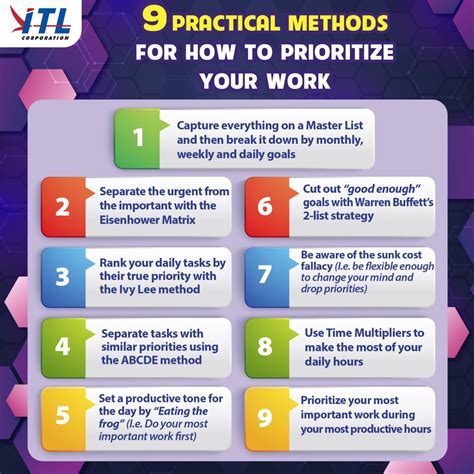Do you find yourself overwhelmed with an abundance of tasks and deadlines that seem to consume your days? Are you constantly searching for ways to maximize your productivity and accomplish more in less time? If so, mastering the art of time management is essential for achieving success and maintaining a healthy work-life balance.
Time management encompasses a range of strategies and techniques that enable individuals to optimize their schedules, prioritize tasks, and improve overall efficiency. By incorporating these practices into your daily routine, you can enhance your ability to complete tasks promptly while minimizing stress and frustration.
1. Utilize Prioritization Techniques: Effectively managing your time requires the ability to distinguish between important, urgent, and non-essential tasks. By prioritizing your responsibilities based on their significance and deadlines, you can allocate your time and energy more efficiently. Consider utilizing techniques such as the Eisenhower Matrix or the ABC method to categorize and organize your tasks accordingly.
2. Embrace Time Blocking: Time blocking involves scheduling specific periods for different activities, allowing you to focus on one task at a time without distractions. By designating dedicated time slots for essential tasks, meetings, and personal activities, you can increase your productivity and ensure that each item on your to-do list receives the attention it deserves.
3. Practice Effective Delegation: Recognize that you don't have to do everything on your own. Delegating tasks to others who possess the necessary skills and knowledge can significantly reduce your workload, granting you more freedom to concentrate on high-priority assignments. Delegation not only saves time, but it also fosters collaboration and empowers team members to grow their skills.
4. Employ Time-Saving Tools and Technology: In today's digital age, numerous apps, software, and tools are available to help streamline your tasks and enhance productivity. From project management software to note-taking applications and time tracking tools, leveraging technology can save you valuable time and effort. Take the time to explore different options and find the ones that best align with your needs and preferences.
5. Cultivate Self-Discipline and Avoid Procrastination: Developing self-discipline is crucial for effective time management. Procrastination can be a significant drain on productivity, leading to increased stress and decreased results. To overcome this habit, break tasks into smaller, manageable steps, establish deadlines, and hold yourself accountable. Embrace strategies such as the Pomodoro Technique, which involves working in focused, timed intervals with short breaks in between, to maintain concentration and avoid distractions.
By implementing these key tips and practicing them consistently, you can revolutionize your approach to time management and become a master of productivity. Remember, effective time management is not just about getting things done; it is about making conscious choices, setting priorities, and utilizing your time and energy in a manner that aligns with your goals and values.
Prioritize Your Tasks Effectively

When it comes to managing your time efficiently, one crucial aspect is the ability to prioritize your tasks effectively. By determining the order of importance and urgency for each task, you can ensure that you are investing your time and energy in the most productive way possible.
To prioritize your tasks effectively, start by identifying the key objectives or goals that you need to accomplish. This will help you establish a clear focus and direction. Next, consider the deadlines or time constraints associated with each task. Assign a level of urgency based on these factors, determining which tasks require immediate attention and which can be addressed later.
Another important consideration when prioritizing tasks is the impact they have on your overall productivity and success. Assess the potential outcomes and benefits of each task, and prioritize those that align with your long-term goals or contribute to significant progress. This will help you avoid getting caught up in tasks that may be less important or provide minimal value.
Furthermore, it is essential to consider your individual strengths and capabilities. Identify tasks that align with your skills and expertise, as you will likely be able to complete them more efficiently. Delegating tasks that fall outside your strengths can also be a wise decision, allowing you to focus on what you excel at and maximize your productivity.
Lastly, remember to be flexible and adaptable when prioritizing tasks. As circumstances change or new opportunities arise, it is important to review and adjust your task list accordingly. This will ensure that you remain focused on the most critical tasks while making room for unexpected developments.
In conclusion, effective task prioritization is a fundamental skill for enhancing overall time management. By determining the order of importance, considering deadlines and impact, leveraging your strengths, and remaining flexible, you can optimize your productivity and make significant progress towards your goals.
Set Clear Goals and Deadlines
Define your objectives and establish specific targets that you aim to achieve within a given timeframe. When setting goals, consider the SMART criteria – make sure they are Specific, Measurable, Achievable, Relevant, and Time-bound. By setting clear goals, you provide yourself with a sense of direction and purpose, fueling your motivation and focus.
Additionally, assign realistic deadlines to your goals, taking into account the complexity and scope of the tasks at hand. Deadlines help create a sense of urgency, ensuring that you prioritize your time effectively and work efficiently to meet your objectives. Establishing clear deadlines also allows you to track your progress and make necessary adjustments to stay on track.
When setting goals and deadlines, it is essential to communicate them to relevant stakeholders or team members. Clearly defined objectives and timelines foster effective collaboration and help everyone involved understand the overall vision and expectations. By engaging others in the process, you foster a supportive environment that promotes accountability and encourages collective effort towards achieving shared goals.
Remember to regularly review and reassess your goals and deadlines as circumstances or priorities change. The ability to adapt and modify your objectives and timelines demonstrates flexibility and ensures that your goals remain relevant and aligned with your evolving needs and circumstances. Embrace the constant evaluation and refinement process as it allows you to optimize your time management strategies and ultimately enhance your productivity and success.
In conclusion, setting clear goals and deadlines is a fundamental aspect of effective time management. It provides structure, focus, and motivation, enabling you to prioritize your tasks and allocate your time efficiently. By incorporating this practice into your routine, you can maximize your productivity, achieve your desired outcomes, and optimize your overall time management skills. Stay proactive, stay organized, and stay committed to reaching your goals.
Minimize Procrastination with Proven Strategies

Maximizing productivity by overcoming delays and avoiding unnecessary distractions is crucial in achieving success. This section delves into effective techniques that can help individuals enhance their time management skills, allowing them to minimize procrastination and accomplish tasks efficiently.
| Proven Strategies | Description |
|---|---|
| 1. Prioritization | Identifying and categorizing tasks based on urgency and importance enables individuals to allocate their time and resources effectively. |
| 2. Break Down Tasks | By breaking larger tasks into smaller, manageable sub-tasks, individuals can overcome the feeling of being overwhelmed and improve their focus and motivation to complete each component. |
| 3. Time Blocking | Setting specific time blocks for different activities ensures that individuals allocate dedicated periods for focused work, minimizing the tendency to procrastinate or get sidetracked. |
| 4. Eliminate Distractions | Creating a conducive environment for work by removing distractions such as notifications, unnecessary gadgets, and other temptations helps individuals maintain their concentration and avoid procrastination. |
| 5. Utilize Tools and Technology | Various time management tools, apps, and software can assist individuals in organizing tasks, setting reminders, and monitoring progress, enabling them to stay on track and reduce procrastination. |
By implementing these proven strategies, individuals can enhance their ability to manage their time effectively, minimize procrastination, and increase productivity. Developing a proactive approach towards completing tasks promptly and efficiently is essential for personal and professional growth.
Delegate and Outsource for Time Savings
Efficiently managing your workload and time requires more than just honing your organizational skills and staying focused. One key strategy to maximize your productivity is delegating tasks to others and outsourcing certain responsibilities. By assigning specific tasks to capable individuals or seeking external expertise, you can free up valuable time and energy to focus on critical tasks that require your unique skills and expertise.
When you delegate tasks, you entrust them to someone else, allowing them to take ownership and responsibility for completing those tasks. This not only helps distribute the workload but also empowers team members to develop their skills and contribute to the overall success of the project or organization.
Outsourcing, on the other hand, involves seeking external assistance or services to handle specific tasks or functions that may be outside your expertise or capacity. This could involve hiring freelancers, contracting a virtual assistant, or engaging specialized service providers to handle non-core activities such as administrative tasks, bookkeeping, or graphic design.
Delegating and outsourcing can save you significant amounts of time, as it enables you to offload repetitive or time-consuming tasks to others who are better suited for the job. By effectively leveraging the abilities and resources of others, you can focus on high-priority tasks that align with your core competencies and contribute to your overall productivity and success.
However, it is important to ensure proper communication and establish clear expectations when delegating or outsourcing. Providing clear instructions, setting deadlines, and maintaining open lines of communication will help ensure that tasks are completed efficiently and to the desired standard. Regular follow-ups and feedback can also help monitor progress and make any necessary adjustments along the way.
In conclusion, delegating and outsourcing tasks can be a game-changer in improving your time management skills. By trusting others to handle certain responsibilities and seeking external assistance when necessary, you can optimize your productivity, prioritize tasks effectively, and ultimately achieve better results in your personal and professional endeavors.
FAQ
What are some essential time management tips?
Some essential time management tips include prioritizing tasks, setting realistic goals, eliminating distractions, delegating tasks whenever possible, and using tools such as calendars or to-do lists.
How can I prioritize my tasks effectively?
To prioritize tasks effectively, you can start by making a list of all the tasks you need to accomplish. Then, you can use techniques such as the Eisenhower Matrix to categorize tasks based on their urgency and importance. This will help you determine which tasks to tackle first.
What are some common distractions and how can I eliminate them?
Some common distractions include social media, email notifications, phone calls, and noisy environments. To eliminate them, you can turn off notifications, set specific times for checking emails and messages, put your phone on silent mode, and find a quiet place to work.
How can I delegate tasks effectively?
To delegate tasks effectively, you should start by assessing your workload and identifying tasks that can be assigned to others. Then, you can communicate clearly with your team members or colleagues, provide necessary instructions and resources, and follow up to ensure that the tasks are completed on time.
What tools can I use to improve my time management skills?
There are various tools that can help improve time management skills, such as digital calendars, productivity apps, project management software, and time tracking tools. These tools can assist in organizing and prioritizing tasks, setting reminders, and tracking progress.
How can I improve my time management skills?
You can improve your time management skills by following these 5 essential tips: 1) Set clear goals and prioritize tasks, 2) Break tasks into smaller, more manageable chunks, 3) Eliminate distractions and set boundaries, 4) Use time management tools and techniques, such as calendars and to-do lists, 5) Learn to delegate and ask for help when needed. By implementing these tips, you will be able to better manage your time and increase your productivity.



